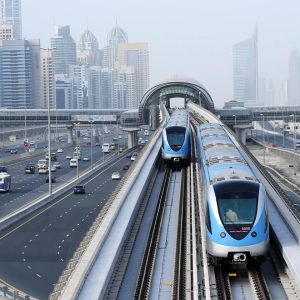
Dubai Roads and Transport Authority (RTA) will start a trial-run of drones to inspect city’s metro tunnels extending 14 km on both the Red and Green Lines. Using drones enables a precise and fast inspection of the condition of assets. It saves the inspection time, enables accessibility to arduous spots and generates highly accurate reports about the condition of tunnels. The initiative, highlighted by the Smart Dubai Strategy 2021, is using custom-made drones equipped with multiple cameras, enabling tunnels’ monitoring via high-definition lenses and the inspection of tunnel walls through infrared radiation.
“The technology generates instant reports easing the assessment of the condition of assets, monitoring the maintenance works and detecting faults. The process is linked with RTA’s Maintenance Department and provides a paperless digital inspection platform that curbs potential human errors,” said Mattar Mohammed Al Tayer, Director-General of RTA.
During a visit to Dubai metro depot at Al Rashidiya, Al Tayer reviewed the initiatives and projects undertaken by the Rail Agency to improve the operation and maintenance of Dubai metro, such as the trial of using nanotechnology at Noor Bank Station. The technology reduced the cost of the station exterior cleaning by 35%, decreased the cleaning and maintenance frequency, and enhanced the protection of front ends and floors of both stations and trains. It also enhanced floor resistance to scratching and adhesion, facilitated self-cleaning and boosted thermal insulation characteristics.
The authorities are implementing a programme on the digitalization of the metro system, which includes the use of onboard smart screens to relay passenger information and ads, and the automated hi-tech fare gates that facilitate passengers flow besides improving security and safety aspects. The process also included the use of giant screens spanning 80 metres at the metro stations platforms.
In addition, RTA has implemented the Smart Stores concept at the depot, which has increased the storage capacity by 700% and increased the operational efficiency by 50%.
3D technology is also implemented for the manufacturing metro parts, which saved time and money and improved quality.
Share on:



